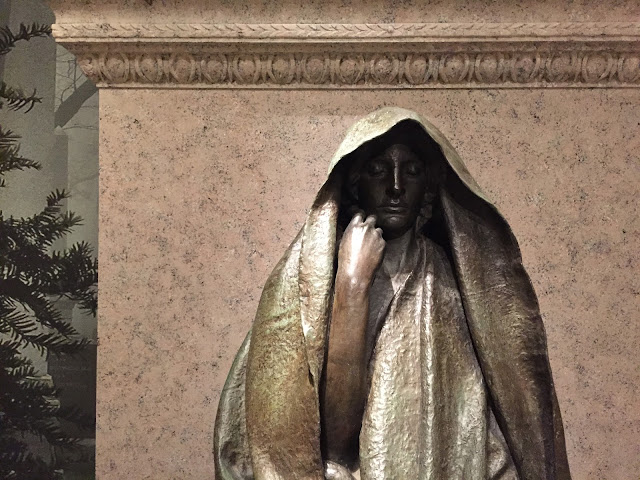Thanks to Grizz65, whose comment yesterday led to today's post.
But collective memory is faulty — we say we'll never forget, but we do, and the American propensity toward amateur slaughter goes back much further. If you had asked me, I'd point to 1966 sniping off the clock tower at the University of Texas at Austin, when a former Marine, Charles Whitman, killed 14 people, at the time the greatest slaughter in United States history by a single gunman.
This was being discussed on my blog, and one reader mentioned Howard Unruh, whose name meant nothing to me. But in 1949, the 28-year-old Army vet walked down River Road in Camden, New Jersey, calmly shooting people with a souvenir German Luger pistol. He killed 13: five men, five women and three children, aged 2, 6 and 9—the 6-year-old, Orris Smith, was slain at point blank range, the gun pressed against his chest as he sat in a barber shop, astride a white carousel horse, getting a haircut because he was starting school tomorrow. His mother sat watching nearby. The barber, J. Clark Hoover, was killed too.
This was being discussed on my blog, and one reader mentioned Howard Unruh, whose name meant nothing to me. But in 1949, the 28-year-old Army vet walked down River Road in Camden, New Jersey, calmly shooting people with a souvenir German Luger pistol. He killed 13: five men, five women and three children, aged 2, 6 and 9—the 6-year-old, Orris Smith, was slain at point blank range, the gun pressed against his chest as he sat in a barber shop, astride a white carousel horse, getting a haircut because he was starting school tomorrow. His mother sat watching nearby. The barber, J. Clark Hoover, was killed too.
Frank Engel, a tavern owner, grabbed a .38 he owned and shot Unruh, wounding him, but failing to stop the rampage. Engel could have shot him a half dozen more times. "I don't know why I didn't do it," he said later.
Friends described Unruh as a quiet kid who kept to himself. "A very quiet fellow" was the way his high school yearbook described him. Indeed, he was oddly polite during the shooting. "Excuse me, sir," he said to one man, shooting him twice. After the murders, as police closed in, Unruh returned to his room at his mother's apartment, where the assistant city editor of the Camden Evening Journal phoned and Unruh picked up.
Friends described Unruh as a quiet kid who kept to himself. "A very quiet fellow" was the way his high school yearbook described him. Indeed, he was oddly polite during the shooting. "Excuse me, sir," he said to one man, shooting him twice. After the murders, as police closed in, Unruh returned to his room at his mother's apartment, where the assistant city editor of the Camden Evening Journal phoned and Unruh picked up.
"Why are you killing people?" the editor asked.
"I don't know," Unruh replied. "I can't answer that yet. I'll have to talk to you later. I'm too busy now."
By then police had thrown tear gas through the window. Uruh came out with his hands up.
"What the matter with you?" one policeman asked. "You a psycho?"
"I'm no psycho," Unruh replied. "I have a good mind."
Bystanders kept saying to reporters that they couldn't understand why it had happened. Prosecutors said the cause was "resentment against his neighbors." Unruh was judged insane and committed to the Trenton Psychiatric Hospital for 60 years, until his death in 2009. He was never found competent to stand trial.
"I'd have killed a thousand if I had enough bullets," he later told a psychiatrist.
Meyer Berger, of the New York Times, won the 1950 Pulitzer Prize for his coverage of the killings, which were not, as commonly believed, the first such rampage in America. Nor, needless to say, the last. If you look at the front page story that ran in the Chicago Daily News, you will notice that its editors had no trouble running the photo of a body sprawled in the street, even identifying it as "Maurice Cohen, drug store proprietor." Cohen was Unruh's neighbor, and apparently had set him off by complaining about him cutting through his yard and playing his radio too loud at night.
Meyer Berger, of the New York Times, won the 1950 Pulitzer Prize for his coverage of the killings, which were not, as commonly believed, the first such rampage in America. Nor, needless to say, the last. If you look at the front page story that ran in the Chicago Daily News, you will notice that its editors had no trouble running the photo of a body sprawled in the street, even identifying it as "Maurice Cohen, drug store proprietor." Cohen was Unruh's neighbor, and apparently had set him off by complaining about him cutting through his yard and playing his radio too loud at night.
So perhaps showing graphic photos of bodies would not have the pacifying effect that some people suspect it might. At the end of October that year, a farmer in Michigan went berserk and shot 10 people with a 12 gauge shotgun.
A professor of psychology told the Daily News that he was disturbed that such incidents might inspire each other, and indicate a "social pattern."
In an odd coincidence that we can expect to see more of as these massacres multiple, Charles Cohen, 12, son of the slain druggist, survived by hiding in a closet. ("Hide, Charlie, hide!" his mother Rose had said, pushing him into the closet before she was killed). The youngster, whose grandmother was killed too, later said, "You get through it, but you never get over it." Through an odd coincidence, he lived to become the grandfather of Carley Novell, who after he died, in 2018 survived the shooting at Marjorie Stoneman Douglas High School in Parkland, Florida by also hiding in a closet, as her grandfather had.
Then as now, pundits struggled to find meaning, though gave up even more readily then than now.
"This is a case of gun-madness," wrote syndicated columnist Robert Ruark, throwing up his hands, despairing at an explanation of why "meek, religion-ridden" Unruh went amok. "All you can do is count the corpses, bury the dead, shut up the wild man and thank God that you yourself were out of range at the time."
Unruh's 2009 obituary noted, "He had a fascination with guns."








